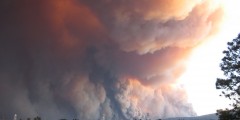IPCC reports, climate change and language work
September 6, 2021
This blog post is not about climate change communication. It is about what I call the ‘language work’ carried out by scientists when writing the various IPCC reports. Introduction On 9 August 2021 the first part of the Sixth Assessment Report of the Intergovernmental Panel on Climate Change, namely the Contribution of Working Group 1 …
When climate change hits home: A personal story
July 18, 2021
This month, Alice Bell has published an important book entitled Our Biggest Experiment: A History of the Climate Crisis. In it, she takes us “back to climate change science’s earliest steps in the eighteenth and nineteenth centuries, through the point when concern started to rise in the 1950s and right up to today, where the …
Chanting to the choir: The dialogical failure of antithetical climate change blogs
April 20, 2020
This is a guest post by Jennifer Metcalfe on a paper she just published. The article explored the potential for people commenting underneath two very different, even antithetical, blogs dealing with climate science, to chat about and engage with climate science. *** My paper, Chanting to the choir: the dialogical failure of antithetical climate change …
Bushfires and climate change communication: Between amplification and attenuation
January 10, 2020
For about a decade I have been thinking and writing about extreme weather events and their links to human-induced climate change, and this included quite a few references to Australia, especially droughts, heatwaves and bushfires. I thought the Las Conchas Fire in New Mexico, lived through by some of my family, was bad. I thought …
Climategate: Some reflections
November 15, 2019
Ten years ago (it seems like yesterday), I was doing relatively pedestrian research on how people talked about climate change. Then, one morning I woke up to the news that emails by climate scientists had been hacked and were being used to cast doubt on the credibility of climate science and the integrity of climate …
A Whole New (re-cycled) World? An interdisciplinary conversation about the Circular Economy, Synthetic Biology and Sustainability Goals
August 21, 2019
This is a guest post by Penny Polson, Carmen McLeod, Sarah Hartley and Eleanor Hadley Kershaw *** Introduction to the Circular Economy The notion of a ‘circular economy’ has been gaining a lot of traction lately. The Ellen MacArthur Foundation, in particular, has raised the profile of this radical rethinking of how consumer goods are …
What is a climate change communicator to do?
July 25, 2019
In a recent article, social scientists claim that a rhetoric of deadlines to urge action on climate change is ‘dangerous’. While I agree that it might be dangerous to get into a situation where you extend deadlines forever if you cannot achieve them, setting no deadlines at all may make it difficult to talk about …
Are we all alarmists now?
July 13, 2018
Over the years I have written many posts about extreme weather events on the one hand and quite a few on so-called alarmism on the other. This was in the context of working on issues related to climate change communication. Some years ago, when writing an article on communicating climate change, I included a sentence …










